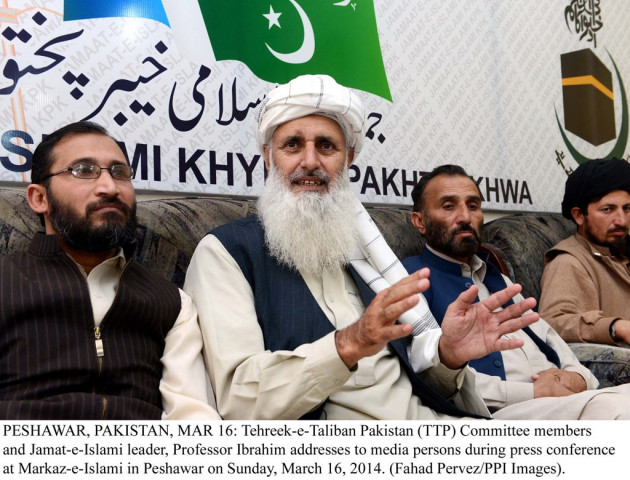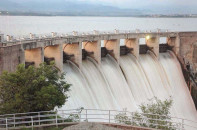Countering sabotage: TTP won’t object to action against Ahrar, says Ibrahim
Says Taliban want release of women, children and elderly; govt denies holding any non-combatants in custody.

Professor Ibrahim said that lack of trust between the government and the Taliban was hampering the dialogue process. PHOTO: PPI
“A hidden hand is actively trying to sabotage the peace process… the Taliban will not object if the government targets those behind the recent acts of violence,” Prof Ibrahim said at a news conference at Jamaat-e-Islami’s provincial headquarters in Peshawar on Sunday. His statement came two days after 21 people were killed and nearly 100 wounded in bomb and suicide attacks in Quetta and Peshawar.
Ahrarul Hind claimed responsibility for both the attacks. The group had previously claimed responsibility for an attack on the Islamabad district courts complex earlier this month which left 11 people, including a judge, dead.
Prof Ibrahim said the Taliban did not know anything about Ahrarul Hind and that they were also trying to find out the whereabouts of the group.
Another Taliban intermediary, Maulana Yousaf Shah said that it was unfair to blame the Taliban for the acts of violence by other groups. “If the country’s entire security apparatus is unable to stop such attacks, then how can the TTP stop such incidents,” Maulana Yousaf, who is the coordinator of the TTP intermediary committee, said while talking to The Express Tribune.
The Taliban intermediaries met Interior Minister Chaudhry Nisar Ali Khan on Saturday to pore over the possible agenda for a direct meeting between government negotiators and Taliban leaders.
However, Prof Ibrahim said the Taliban have demanded the release of all ‘non-combatants’ affiliated with the group before face-to-face talks could begin. And the Taliban intermediaries have conveyed this demand to the government. By non-combatants, the TTP means women, children and elderly people detained by the security agencies.
Defence Minister Khawaja Asif on Sunday, however, strongly denied that the security agencies have any woman or child linked to the Taliban in custody. At the same time, he offered a government probe into the Taliban’s claims, if proof was provided.
“We will investigate if the Taliban’s committee comes up with proof regarding the detention of children and women [by the security agencies],” several news channels quoted him as saying.
According to sources, the minister made the statement after military authorities informed the government that there was no truth to the Taliban’s claims.
“No women or children were ever taken into custody during the [security] operations against militant outfits… the term ‘non-combatant’ is being used to mislead people,” a security official told The Express Tribune on condition of anonymity.
“Suspects found not to be involved in terrorist activities are released. Only those found guilty of involvement are sent to internment centres for legal action,” he said. “So, there is no question of non-combatants being in security agencies’ custody.”
The official cautioned that the release of Taliban prisoners in haste would not only create legal complications but have negative fallout on the country’s efforts to tackle militancy.
Security agencies’ insistence that they are not holding any non-combatants could prove to be a ‘deal breaker’ between the government and the TTP. A member of the government peace committee acknowledged that progress in talks hinges on the issue of prisoners.
“The major challenge for the two sides is to find common ground,” he said. The committee member added that the TTP would have to come up with evidence about the detention of non-combatants by the security agencies.
At Sunday’s news conference, Professor Ibrahim said that lack of trust between the government and the Taliban was hampering the dialogue process. He added that he and other intermediaries were trying to restore confidence between the two sides.
Yousaf Shah, meanwhile, said the TTP would declare a permanent ceasefire if the government undertook serious confidence-building measures. “The Taliban will definitely declare a permanent ceasefire, just as they announced an unconditional ceasefire earlier, if their trust is not shattered by the government,” he told The Express Tribune.
Published in The Express Tribune, March 17th, 2014.



















COMMENTS
Comments are moderated and generally will be posted if they are on-topic and not abusive.
For more information, please see our Comments FAQ